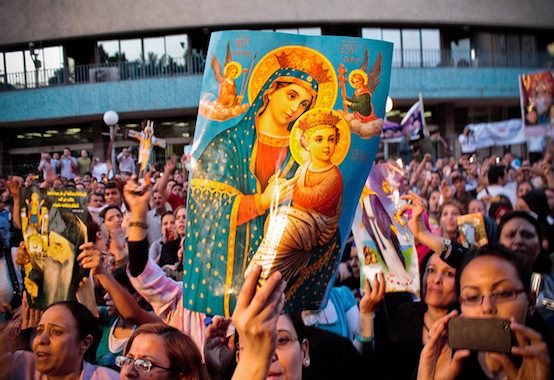Don’t Forget the Copts in Egypt’s Chaos

The White House announced Monday that they will not cut aid to Egypt. Press Secretary Jay Carney went so far as to question whether Morsi’s removal truly constitutes a coup, since “tens of millions” of Egyptians did not consider it so.
“This is a complex and difficult issue with significant consequences,” Carney said. Our objective, according to Carney, is “to assist the Egyptian people in their transition to democracy.”
But Nadia Ghaly, an Egyptian journalist, said every time the United States “interferes in a country’s fate,” things go wrong. The West’s intervention, in her mind, would only serve to undermine Egypt’s political awakening. “We need hundreds of years before we are able to understand and practice democracy,” she said in an email interview, adding that the country should “feed the mouths they are responsible for before anything else.”
The Coptic Pope Tawadros II has complained that Morsi wanted to Islamize the government and ignored the plight of Egyptian Copts, who face escalating persecution since the coup.
Some Copts hope Morsi’s overthrow will lead to real democracy: Magdi Khalil, a Coptic activist in Northern Virginia, told the Washington Post that “this is an historical chance to bring democracy and take action against the Islamist phenomenon everywhere.”
But in the coup’s violent aftermath, Coptic Christian Mina Abdulamek expressed fear for her Coptic relatives. “All my friends and family are in Cairo,” she said. We are telling my sisters to stay home. They don’t wear headscarves, so it is easy to tell a Christian girl from a Muslim one.”
Daniel Larison wrote that this coup will not prevent religious violence: “The coup isn’t likely to weaken political Islam in Egypt or elsewhere over the long term, but will push Islamists out of the political process and encourage fanaticism to flourish unchecked.”
Fanaticism may in fact be flourishing already: in Naga Hassan village, west of Luxor, Morsi supporters have burned 23 Coptic Christian homes since July 5. Police are trying to protect Copts from angry Morsi supporters.
Walter Russell Mead argued that Egypt’s “controlling reality” is that no one knows how to build the country Egyptians want. In the midst of this leadership deficit, “Egypt must be governed even if it can’t be governed well. The next stage of Egypt’s revolution will be about the construction of a government without hope.”
No one can celebrate Egypt’s failed democratic process. But perhaps, as Richard Cohen put it, “Egypt’s problems are so daunting that the lack of democracy is not the top priority. First things first. Before Egypt needs a democratic government, it just needs a government.”
As Ghaly said, mouths must be fed before democracy can flourish.
Comments